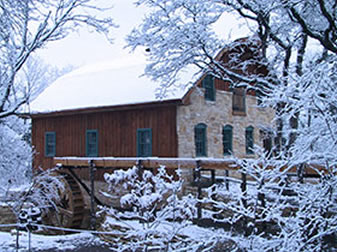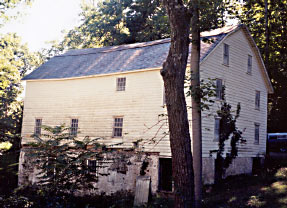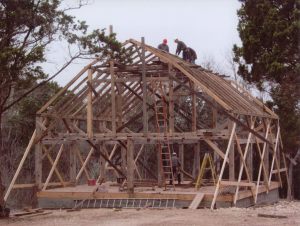Homestead
Gristmill
In 2000, the craftsmen of Homestead Heritage carefully documented and
dismantled the Teeter mill and restored it in its new location at
Homestead Heritage in central Texas.

Winter at Gristmill
Given a new life as
Homestead
Gristmill, the mill is open to the public year round, grinding fresh
whole wheat flour, corn meal, and other grains much as it did over 230
years ago.
“ Beginning at a large white oak marked for a corner standing near a
small swamp on the south west side of 5B5Bthe brook below the mill…”

This excerpt from a 1768 land deed is the
first known written record of our Homestead Gristmill along the Hollow
Brook or Mill Creek in Hunterdon County, New Jersey, when a German
immigrant named Asher Mott decided to sell his share of the family
property to his older brothers, John and Gershom, for £1,000. The
property stayed in the family until 1800 when Robert Emley purchased the
mill and 30 acres for $213.30.
In 1814 John Teeter, another German immigrant and local resident for
over 30 years, acquired the mill and property. By then, the mill was the
business and social center of a village that included six residences and
a sawmill located downstream. This hamlet was referred to as Teetertown.
Six years later the mill was extensively remodeled and turned over to
Mr. Teeter’s son-in-law Samuel Dorland. The Dorland family operated and
maintained the mill until 1881.
In 1908, following several ownerships, Philip Sliker purchased the
mill, constructed a new miller’s residence, and began to process flour
under the brand name of “Teetertown Buckwheat Flour.” But in 1918, after
10 years of operation, Mr. Sliker retired and closed the mill.

After it last ground grain in 1918, the Teeter mill went through a
series of owners, most looking for a quaint country getaway from the
bustle of New York City. Left neglected for decades, by the turn of the
21st century the aged mill was in need of either demolition or
restoration.
See more at
www.homesteadheritage.com

